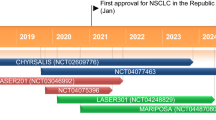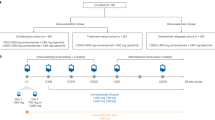Abstract
Erlotinib is a low molecular weight, orally active, epidermal growth factor receptor (EGFR) tyrosine kinase inhibitor. Inhibition of EGFR tyrosine kinase results in the disruption of processes involved in cancer growth and development, including cell migration, proliferation, angiogenesis, and apoptosis.
In the well designed, phase III SATURN study, oral erlotinib 150mg/day as maintenance treatment prolonged progression-free survival (PFS) in patients with non-small-cell lung cancer (NSCLC) who had not progressed after four cycles of first-line platinum doublet chemotherapy. PFS was significantly longer with erlotinib than with placebo in patients who were analyzable for PFS and in the subgroup of these patients with EGFR immunohistochemistry-positive tumors (co-primary endpoints).
The improvement in PFS was independent of several baseline and clinical characteristics, including histology, smoking status, and EGFR mutation status, although a greater treatment benefit was observed in patients with tumors bearing EGFR-activating mutations than in those with wild-type EGFR tumors.
Overall survival in the SATURN study was significantly longer with erlotinib than with placebo in the intent-to-treat population, in patients with EGFR immunohistochemistry-positive tumors, and in patients with wild-type EGFR tumors. Median overall survival had not yet been reached in patients with tumors bearing EGFR-activating mutations.
Oral erlotinib as maintenance therapy was generally well tolerated in patients with NSCLC in the SATURN study and had a tolerability profile generally similar to that observed in a trial of erlotinib monotherapy as second-line treatment in patients with NSCLC.

Similar content being viewed by others
References
Ferlay J, Parkin DM, Steliarova-Foucher E. Estimates of cancer incidence and mortality in Europe in 2008. Eur J Cancer 2010 Mar; 46 (4): 765–81
Ferlay J, Shin H-R, Bray F, et al. Estimates of worldwide burden of cancer in 2008: GLOBOCAN 2008. Int J Cancer 2010; 127 (12): 2893–917
Ramalingam S, Belani C. Systemic chemotherapy for advanced non-small cell lung cancer: recent advances and future directions. Oncologist 2008; 13 Suppl. 1: 5–13
Dancey JE. Epidermal growth factor receptor inhibitors in non-small cell lung cancer. Drugs 2007; 67 (8): 1125–38
Cappuzzo F, Ciuleanu T, Stelmakh L, et al. Erlotinib as maintenance treatment in advanced non-small-cell lung cancer: a multicentre, randomised, placebo-controlled phase 3 study. Lancet Oncol 2010 Jun; 11 (6): 521–9
Coate LE, Shepherd FA. Maintenance therapy in advanced non-small cell lung cancer. J Thorac Oncol 2010 May; 5 (5): 723–34
Triano LR, Deshpande H, Gettinger SN. Management of patients with advanced non-small cell lung cancer: current and emerging options. Drugs 2010; 70 (2): 167–79
National Comprehensive Cancer Network. NCCN Clinical Practice Guidelines in Oncology (NCCN Guidelines): Non-Small Cell Lung Cancer, version 3.2011 [online]. Available from URL: http://www.nccn.org/professionals/physician_gls/pdf/nscl.pdf[Accessed 2011 Mar 22]
D’Addario G, Früh M, Reck M, et al. Metastatic non-small-cell lung cancer: ESMO Clinical Practice Guidelines for diagnosis, treatment and follow-up. Ann Oncol 2010 May; 21 Suppl. 5: v116–9
Owonikoko TK, Ramalingam SS, Belani CP. Maintenance therapy for advanced non-small cell lung cancer: current status, controversies, and emerging consensus. Clin Cancer Res 2010 May 1; 16 (9): 2496–504
Roche. Summary of Product Characteristics: Tarceva 25 mg film-coated tablets [online]. Available from URL: http://www.ema.europa.eu/docs/en_GB/document_library/EPAR_-_Product_Information/human/000618/WC500033994.pdf[Accessed 2010 Nov 10]
Robinson DM, Keating GM, Perry CM. Erlotinib. Am J Cancer 2005; 4 (4): 247–52
Hidalgo M, Bloedow D. Pharmacokinetics and pharmacodynamics: maximizing the clinical potential of erlotinib (Tarceva). Semin Oncol 2003 Jun; 30 (3 Suppl. 7): 25–33
Ciardiello F, Tortora G. A novel approach in the treatment of cancer: targeting the epidermal growth factor receptor. Clin Cancer Res 2001 Oct; 7 (10): 2958–70
Yarden Y, Sliwkowski MX. Untangling the ErbB signalling network. Nat Rev Mol Cell Biol 2001 Feb; 2 (2): 127–37
Genentech Inc. Tarceva®: US prescribing information [online]. Available from URL: http://www.gene.com/gene/products/information/pdf/tarceva-prescribing.pdf[Accessed 2010 Nov 25]
Pao W, Miller VA. Epidermal growth factor receptor mutations, small-molecule kinase inhibitors, and non-small-cell lung cancer: current knowledge and future directions. J Clin Oncol 2005 Apr 10; 23 (11): 2556–68
Moyer JD, Barbacci EG, Iwata KK, et al. Induction of apoptosis and cell cycle arrest by CP-358,774, an inhibitor of epidermal growth factor receptor tyrosine kinase. Cancer Res 1997 Nov 1; 57 (21): 4838–48
Pollack VA, Savage DM, Baker DA, et al. Inhibition of epidermal growth factor receptor-associated tyrosine phosphorylation in human carcinomas with CP-358,774: dynamics of receptor inhibition in situ and antitumor effects in athymic mice. J Pharmacol Exp Ther 1999 Nov; 291 (2): 739–48
Ling YH, Li T, Yuan Z, et al. Erlotinib, an effective epidermal growth factor receptor tyrosine kinase inhibitor, induces p27KIP1 up-regulation and nuclear translocation in association with cell growth inhibition and G1/S phase arrest in human non-small-cell lung cancer cell lines. Mol Pharmacol 2007 Aug; 72 (2): 248–58
Qian X, Li J, Ding J, et al. Erlotinib activates mitochondrial death pathways related to the production of reactive oxygen species in the human non-small cell lung cancer cell line A549. Clin Exp Pharmacol Physiol 2009 May; 36 (5–6): 487–94
Schaefer G, Shao L, Totpal K, et al. Erlotinib directly inhibits HER2 kinase activation and downstream signaling events in intact cells lacking epidermal growth factor receptor expression. Cancer Res 2007 Feb 1; 67 (3): 1228–38
Ling YH, Lin R, Perez-Soler R. Erlotinib induces mitochondrial-mediated apoptosis in human H3255 non-small-cell lung cancer cells with epidermal growth factor receptor L858R mutation through mitochondrial oxidative phosphorylation-dependent activation of BAX and BAK. Mol Pharmacol 2008 Sep; 74 (3): 793–806
Higgins B, Kolinsky K, Smith M, et al. Antitumor activity of erlotinib (OSI-774, Tarceva) alone or in combination in human non-small cell lung cancer tumor xenograft models. Anticancer Drugs 2004 Jun; 15 (5): 503–12
Dai Q, Ling Y-H, Lia M, et al. Enhanced sensitivity to the HER1/epidermal growth factor receptor tyrosine kinase inhibitor erlotinib hydrochloride in chemotherapy-resistant tumor cell lines. Clin Cancer Res 2005 Feb 15; 11 (4): 1572–8
Amann J, Kalyankrishna S, Massion PP, et al. Aberrant epidermal growth factor receptor signaling and enhanced sensitivity to EGFR inhibitors in lung cancer. Cancer Res 2005 Jan 1; 65 (1): 226–35
Gong Y, Somwar R, Politi K, et al. Induction of BIM is essential for apoptosis triggered by EGFR kinase inhibitors in mutant EGFR-dependent lung adenocarcinomas. PLoS Med 2007 Oct 9; 4 (10): e294
Pao W, Miller V, Zakowski M, et al. EGF receptor gene mutations are common in lung cancers from “never smokers” and are associated with sensitivity of tumors to gefitinib and erlotinib. Proc Natl Acad Sci U S A 2004 Sep 7; 101 (36): 13306–11
Tsao MS, Sakurada A, Cutz JC, et al. Erlotinib in lung cancer: molecular and clinical predictors of outcome. N Engl J Med 2005 Jul 14; 353 (2): 133–44
Zhu CQ, daCunha Santos G, Ding K, et al. Role of KRAS and EGFR as biomarkers of response to erlotinib in National Cancer Institute of Canada Clinical Trials Group Study BR.21. J Clin Oncol 2008 Sep 10; 26 (26): 4268–75
Paz-Ares L, Soulieres D, Melezinek I, et al. Clinical outcomes in non-small-cell lung cancer patients with EGFR mutations: pooled analysis. J Cell Mol Med 2010 Jan; 14 (1–2): 51–69
Rosell R, Moran T, Queralt C, et al. Screening for epidermal growth factor receptor mutations in lung cancer. N Engl J Med 2009 Sep 3; 361 (10): 958–67
Shepherd FA, Rodrigues Pereira J, Ciuleanu T, et al. Erlotinib in previously treated non-small-cell lung cancer. N Engl J Med 2005 Jul 14; 353 (2): 123–32
Pao W, Miler VA, Politi KA, et al. Acquired resistance of lung adenocarcinomas to gefitinib or erlotinib is associated with a second mutation in the EGFR kinase domain. PLoS Med 2005 Mar; 2 (3): e73
Nguyen KS, Kobayashi S, Costa DB. Acquired resistance to epidermal growth factor receptor tyrosine kinase inhibitors in non-small-cell lung cancers dependent on the epidermal growth factor receptor pathway. Clin Lung Cancer 2009 Jul; 10 (4): 281–9
Morgillo F, Woo JK, Kim ES, et al. Heterodimerization of insulin-like growth factor receptor/epidermal growth factor receptor and induction of survivin expression counteract the antitumor action of erlotinib. Cancer Res 2006 Oct 15; 66 (20): 10100–11
Ling J, Johnson KA, Miao Z, et al. Metabolism and excretion of erlotinib, a small molecule inhibitor of epidermal growth factor receptor tyrosine kinase, in healthy male volunteers. Drug Metab Dispos 2006 Mar; 34 (3): 420–6
Frohna P, Lu J, Eppler S, et al. Evaluation of the absolute oral bioavailability and bioequivalence of erlotinib, an inhibitor of the epidermal growth factor receptor tyrosine kinase, in a randomized, crossover study in healthy subjects. J Clin Pharmacol 2006 Mar; 46 (3): 282–90
Hidalgo M, Siu LL, Nemunaitis J, et al. Phase I and pharmacologic study of OSI-774, an epidermal growth factor receptor tyrosine kinase inhibitor, in patients with advanced solid malignancies. J Clin Oncol 2001 Jul; 19: 3267–79
Lu JF, Eppler SM, Wolf J, et al. Clinical pharmacokinetics of erlotinib in patients with solid tumors and exposure-safety relationship in patients with non-small cell lung cancer. Clin Pharmacol Ther 2006 Aug; 80 (2): 136–45
Togashi Y, Masago K, Fukudo M, et al. Cerebrospinal fluid concentration of erlotinib and its active metabolite OSI-420 in patients with central nervous system metastases of non-small cell lung cancer. J Thorac Oncol 2010; 5 (7): 950–5
Li J, Zhao M, He P, et al. Differential metabolism of gefitinib and erlotinib by human cytochrome P450 enzymes. Clin Cancer Res 2007 Jun 15; 13 (12): 3731–7
Hughes AN, O’Brien ME, Petty WJ, et al. Overcoming CYP1A1/1A2 mediated induction of metabolism by escalating erlotinib dose in current smokers. J Clin Oncol 2009 Mar 10; 27 (8): 1220–6
Hamilton M, Wolf JL, Rusk J, et al. Effects of smoking on the pharmacokinetics of erlotinib. Clin Cancer Res 2006 Apr 1; 12 (7 Pt 1): 2166–71
Hamilton M, Wolf JL, Zborowski D, et al. Tarceva™ (erlotinib) exposure/ effects (EE) analysis from a phase III study in advanced NSCLC: effect of smoking on the PK of erlotinib [abstract no. 6165]. Proc Am Assoc Cancer Res 2005; 46: 1451
Miller AA, Murry DJ, Owzar K, et al. Phase I and pharmacokinetic study of erlotinib for solid tumors in patients with hepatic or renal dysfunction: CALGB 60101. J Clin Oncol 2007 Jul 20; 25 (21): 3055–60
Togashi Y, Masago K, Fukudo M, et al. Pharmacokinetics of erlotinib and its active metabolite OSI-420 in patients with non-small cell lung cancer and chronic renal failure who are undergoing hemodialysis. J Thorac Oncol 2010 May; 5 (5): 601–5
Brugger W, Kim JH, Hansen O, et al. Molecular markers and clinical outcome with erlotinib: results from the phase III placebo-controlled SATURN study of maintenance therapy for advanced NSCLC [abstract no. B9.1]. J Thorac Oncol 2009; 4 (9 Suppl. 1): S348–9
Juhasz E, Kim J-H, Stelmakh L, et al. Maintenance therapy of non-small cell lung cancer with erlotinib preserves quality of life [abstract no. 439P]. Ann Oncol 2010; 21 Suppl. 8: viii147
Cappuzzo F, Ciuleanu T-E, Park K, et al. Erlotinib maintenance therapy in patients with stable disease after first-line platinum-doublet chemotherapy for advanced NSCLC [abstract no. 369PD]. Ann Oncol 2010; 21 Suppl. 8: viii124
Perol M, Zalcman G, Monnet I, et al. Final results from the IFCT-GFPC 0502 phase III study: maintenance therapy in advanced NSCLC with either gemcitabine (G) or erlotinib (E) versus observation (O) after cisplatin-gemcitabine induction chemotherapy (CT), with a predefined second-line treatment [abstract no. 370PD]. Ann Oncol 2010; 21 Suppl. 8: viii124. Plus poster presented at the 35th ESMO Congress; 2010 Oct 8–12; Milan
European Medicines Agency. Assessment report for Tarceva [online]. Available from URL: http://www.ema.europa.eu/docs/en_GB/document_library/EPAR_-_Assessment_Report_-_Variation/human/000618/WC500090680.pdf[Accessed 2011 Jan 24]
Acknowledgments and Disclosures
The manuscript was reviewed by: S. Cicenas, Institute of Oncology, Vilnius University, Vilnius, Lithuania; M. Pérol, Service de Pneumologie, Hôpital de la Croix-Rousse, Hospices Civils de Lyon, Lyon, France.
The preparation of this review was not supported by any external funding. During the peer review process, the manufacturer of the agent under review was offered an opportunity to comment on this article. Changes resulting from comments received were made on the basis of scientific and editorial merit.
Author information
Authors and Affiliations
Rights and permissions
About this article
Cite this article
Muir, V.J., Dhillon, S. Erlotinib. BioDrugs 25, 139–146 (2011). https://doi.org/10.2165/11206910-000000000-00000
Published:
Issue Date:
DOI: https://doi.org/10.2165/11206910-000000000-00000




